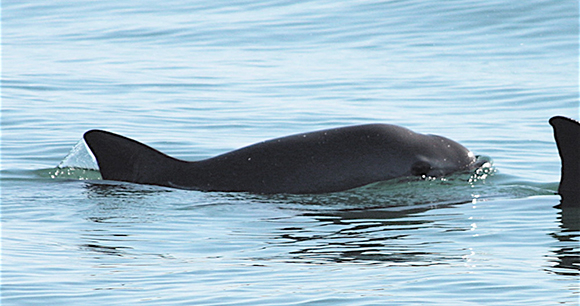
Mexico’s Failure to Control Illegal Fishing, Trade Threatens 10 Remaining Vaquita
New York—In a settlement filed in court Friday, the US Department of the Interior (DOI) agreed to determine whether Mexico has failed to stop illegal fishing and trade of totoaba that is driving the vaquita porpoise’s extinction. The determination could result in an embargo against Mexico.
In response to a lawsuit filed last year by the Animal Welfare Institute, the Center for Biological Diversity, and NRDC (Natural Resources Defense Council), DOI will decide by May 19 (with a public announcement by June 3) whether to formally certify Mexico under the US Pelly Amendment to the Fishermen’s Protective Act for undermining the effectiveness of the Convention on International Trade in Endangered Species of Wild Fauna and Flora (CITES). If Mexico is certified, President Joe Biden can embargo imports, including seafood and other wildlife, from Mexico.
“We’re relieved the US government is finally going to make this call,” said Sarah Uhlemann, international program director at the Center for Biological Diversity. “The vaquita is on the very precipice of extinction, and strong US sanctions will force Mexico to pull this little porpoise back from the brink.”
The announcement follows a recent decision by the CITES Secretariat that triggered the suspension of all commercial trade in CITES-protected species with Mexico for Mexico’s failure to submit an adequate plan to control totoaba fishing and trafficking that threatens the vaquita. Additional US import restrictions pursuant to a Pelly certification could be broader, potentially banning all wildlife products from Mexico, not just CITES-protected wildlife.
“It’s shameful that previous administrations did not use this tool to help save the critically endangered vaquita and that we had to go to court to force action,” said Zak Smith, director of global biodiversity conservation at NRDC (Natural Resources Defense Council). “This administration must do better. Secretary Haaland and President Biden should use the power Congress gave them to compel Mexican action.”
Highly imperiled vaquita are found only in Mexico’s Upper Gulf of California. The porpoises become entangled and drown in illegal nets set to catch shrimp and fish, including the totoaba, an endangered species coveted in China and elsewhere for its swim bladder. The Mexican government has repeatedly failed to enforce its own ban on fishing in the vaquita’s habitat. Only around 10 vaquita likely remain, and scientists predict the species will soon be extinct unless Mexico halts illegal fishing in the vaquita’s habitat
In 2014. conservationists filed a legal petition requesting a ban on imports from Mexico under the Pelly Amendment. This law requires DOI to certify nations that “diminish the effectiveness of” or violate international wildlife agreements, such as CITES. Mexico’s failure to halt totoaba fishing and trade undermines CITES, which bans the totoaba trade. In December 2022, after DOI failed to respond to the petition for more than eight years, conservationists sued to force a decision. During this eight-year period, the vaquita population declined by more than 90%.
“While DOI dithered, the vaquita population plunged from approximately 100 animals to fewer than 10,” said DJ Schubert, wildlife biologist at the Animal Welfare Institute. “DOI must certify Mexico and the White House must impose broader trade sanctions if the vaquita has any hope of surviving.”
If DOI certifies Mexico, Biden must notify Congress within 60 days of any actions taken by him to ban imports from Mexico. The White House could impose trade sanctions on Mexico, including banning the import of any Mexican seafood. A significant share of income from all Mexican fishery exports is from US trade; the United States imported roughly $745 million worth of edible seafood products from Mexico in 2022.
Illegal fishing continues in the vaquita’s habitat. On March 9, it was reported that as many as 38 vessels were observed in the vaquita refuge. They were likely fishing with deadly gillnet gear.
Marjorie Fishman, Animal Welfare Institute
margie@awionline.org, (202) 446-2128
Sarah Uhlemann, Center for Biological Diversity
suhlemann@biologicaldiversity.org, (206) 327-2344
Josh Mogerman, NRDC
jmogerman@nrdc.org, 312-651-7909
Kate O’Connell, Animal Welfare Institute
kate.oconnell@balaena.org, (en español), (860) 990-7858
The Animal Welfare Institute (awionline.org) is a nonprofit charitable organization founded in 1951 and dedicated to reducing animal suffering caused by people. AWI engages policymakers, scientists, industry, and the public to achieve better treatment of animals everywhere—in the laboratory, on the farm, in commerce, at home, and in the wild. Follow us on Facebook, Twitter, and Instagram for updates and other important animal protection news.
The Center for Biological Diversity (biologicaldiversity.org) is a national, nonprofit conservation organization with more than 1.7 million members and online activists dedicated to the protection of endangered species and wild places.
NRDC (Natural Resources Defense Council) is an international nonprofit environmental organization with more than 3 million members and online activists. Since 1970, our lawyers, scientists, and other environmental specialists have worked to protect the world's natural resources, public health, and the environment. NRDC has offices in New York City, Washington, D.C., Los Angeles, San Francisco, Chicago, Bozeman, MT, and Beijing. Visit us at www.nrdc.org and follow us on Twitter @NRDC.